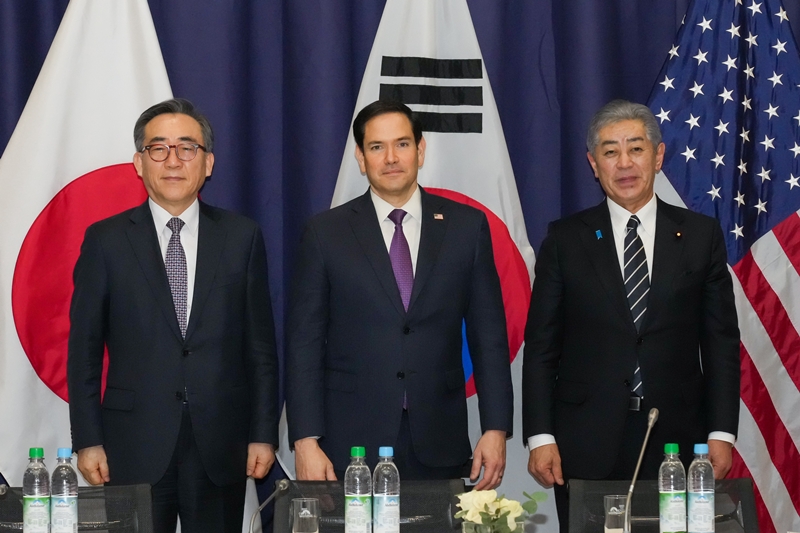
Minister of Foreign Affairs Cho Tae-yul (left), U.S. Secretary of State Marco Rubio (center) and Japanese Minister of Foreign Affairs Takeshi Iwaya on Feb. 15 pose for a group photo in their trilateral talks on the sidelines of the Munich Security Conference in Munich, Germany. (Korean Ministry of Foreign Affairs)
By Margareth Theresia
Minister of Foreign Affairs Cho Tae-yul has reaffirmed with his U.S., and Japanese counterparts their trilateral commitment to the complete denuclearization of North Korea and stronger sanctions on Pyeongyang.
The Ministry of Foreign Affairs on Feb. 15 said Minister Cho, U.S. Secretary of State Marco Rubio and Japanese Minister of Foreign Affairs Takeshi Iwaya on Feb. 15 held a trilateral summit in Munich, Germany, and issued a joint statement on responding to the North and its nuclear weapons as well as expanded economic cooperation.
The meeting was the first of its kind since the launch of the second Trump administration in the U.S.
The three ministers agreed that their trilateral cooperation made a major contribution to the safety, security and prosperity of the Indo-Pacific region and agreed to further boost their collaboration. They also stressed that their cooperation is expanding beyond diplomacy and security to include economic security and advanced technology.
Based on this understanding, the ministers agreed to further raise the systemization of trilateral cooperation and expand the seamless operation of consultative bodies and secretariats at all levels.
In addition, they reaffirmed their firm will for the complete denuclearization of the North and agreed to keep strengthening sanctions against it. For this, they pledged a strong stance against Pyeongyang's violations and evasions of United Nations Security Council resolutions.
In a joint statement, the three ministers "strongly opposed any coercive unilateral attempts to change the status quo in the Indo-Pacific region, including the South China Sea," adding, "They emphasized their commitment to maintaining a free and open Indo-Pacific and ensuring international law prevails."
The three sides also discussed cooperation in economic security and advanced technologies.
"They also welcomed efforts to diversify critical minerals supply chains and to collaborate on developing and deploying cutting-edge small modular reactor and other advanced nuclear reactor technology," the statement said. "They committed to deepening cooperation on artificial intelligence, semiconductors, quantum science and technology, cybersecurity, biotechnology and its enabling infrastructure, as well as digital information and communications technology infrastructure."
The three ministers also welcomed Korea's hosting and chair of this year's Asia-Pacific Economic Cooperation Summit and "pledged to work closely to achieve meaningful outcomes."
margareth@korea.kr
Most popular
- Korea.net welcomes 2025 K-influencers, Honorary Reporters
- 2025 Honorary Reporter class pledges to spread 'real Korea' worldwide
- US urged to exempt tariffs on Korea in first '2+2' trade talks
- Korean culture festival in Cuba marks 1st year of bilateral ties
- Slew of festivals, events scheduled in downtown Seoul in May
